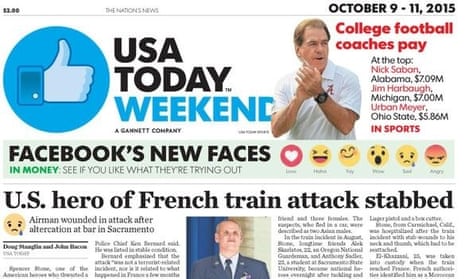The front page of the US’s best-selling newspaper may have confused some of its less web-savvy readers on Friday.
Each story on the front page of USA Today’s weekend edition was accompanied by an emoji – a small symbol denoting an emotion such as happiness or anger.
An article about Russian bombing of Syria was illustrated with an angry red face, while a story about the stabbing of a US citizen – who had recently helped stop a terrorist attack in France – carried a sad face with a tear emerging from one eye.
Emojis – not to be confused with their more basic text-based cousins emoticons – are a common feature of online messaging on smartphones and computers.
Their use by USA Today was inspired by Facebook, which is testing Reactions, a new set of responses to posts that go beyond the simple “like”.
USA Today editor-in-chief David Callaway told the Guardian the experiment was an attempt to stir debate as Facebook’s introduction of emojis could lead to a billion people regularly using them.
He said: “I doubt they will become a core part of print articles, but we wanted to see what it would look like ... I think we’ll see more experimenting with digital practices in print, even if they don’t become mainstream.”
The stunt received a mixed reaction on Twitter, with some pointing out that it jarred with the serious nature of the stories being covered and others questioning whether emojis had a place in print.
So the USA today put FB's new emojis in their print edition. It feels so wrong on paper IMHO via @jodiontheweb pic.twitter.com/dv7AhFL1Ke
— Felicity Morse (@FelicityMorse) October 9, 2015
Callaway added: “Anecdotally, the more digital people are, the more they seemed to like them. They have become an acceptable way of expressing oneself online, in sharing news stories as well as anything else.”
“But as you can see from the reaction, some segment of the readership still believes print interaction with readers should be different from online interaction.”
USA Today is far from the first news outlet to recognise the power of emojis. The Guardian has experimented with an emojji translation of president Barack Obama’s state of the union address, while this summer BuzzFeed conducted the UK’s first completely Emoji-based political interview with Scottish Labour leader Kezia Dugdale.

Comments (…)
Sign in or create your Guardian account to join the discussion